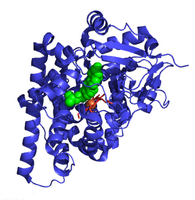
Photo from wikipedia
Activation of the steroidogenic enzyme CYP11A1 was shown to be necessary for the development of peanut-induced intestinal anaphylaxis and IL-13 production in allergic mice. We determined if levels of CYP11A1… Click to show full abstract
Activation of the steroidogenic enzyme CYP11A1 was shown to be necessary for the development of peanut-induced intestinal anaphylaxis and IL-13 production in allergic mice. We determined if levels of CYP11A1 in peripheral blood T cells from peanut-allergic (PA) children compared to non-allergic controls were increased and if levels correlated to IL-13 production and oral challenge outcomes to peanut. CYP11A1 mRNA and protein levels were significantly increased in activated CD4+ T cells from PA patients. In parallel, IL-13 production was significantly increased; IFNγ levels were not different between groups. There were significant correlations between expression levels of CYP11A1 mRNA and levels of IL13 mRNA and protein, levels of serum IgE anti-Ara h 2 and to outcomes of peanut challenge. The importance of CYP11A1 on cytokine production was tested using a CYP11A1 CRISPR/Cas9 KO plasmid or an inhibitor of enzymatic CYP11A1 activity. Inhibition of CYP11A1 activation in patient cells treated with the inhibitor, aminoglutethimide, or CD4+ T cell line transfected with the CYP11A1 KO plasmid resulted in reduced IL-13 production. These data suggest that the CYP11A1-CD4+Tcell-IL-13 axis in activated CD4+ T cells from PA children is associated with development of PA reactions. CYP11A1 may represent a novel target for therapeutic intervention in PA children.
Journal Title: PLoS ONE
Year Published: 2020
Link to full text (if available)
Share on Social Media: Sign Up to like & get
recommendations!